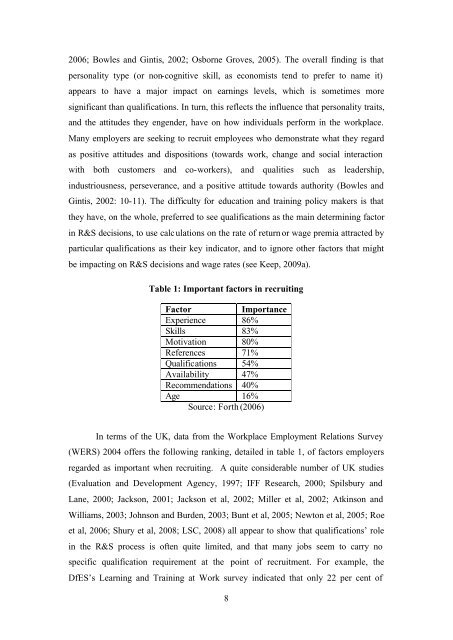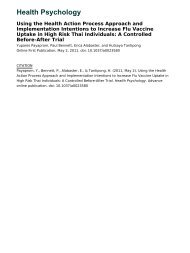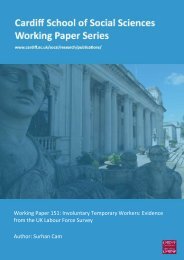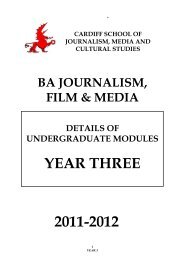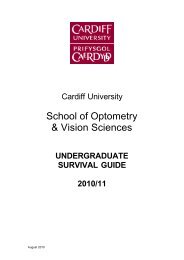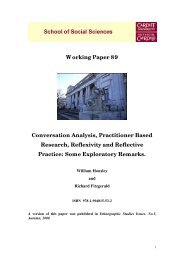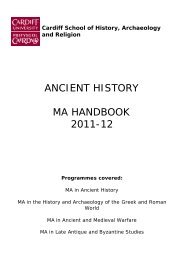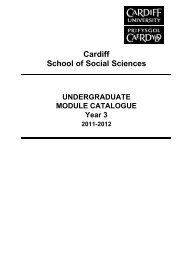Recruitment and Selection â the Great Neglected ... - Cardiff University
Recruitment and Selection â the Great Neglected ... - Cardiff University
Recruitment and Selection â the Great Neglected ... - Cardiff University
You also want an ePaper? Increase the reach of your titles
YUMPU automatically turns print PDFs into web optimized ePapers that Google loves.
2006; Bowles <strong>and</strong> Gintis, 2002; Osborne Groves, 2005). The overall finding is that<br />
personality type (or non-cognitive skill, as economists tend to prefer to name it)<br />
appears to have a major impact on earnings levels, which is sometimes more<br />
significant than qualifications. In turn, this reflects <strong>the</strong> influence that personality traits,<br />
<strong>and</strong> <strong>the</strong> attitudes <strong>the</strong>y engender, have on how individuals perform in <strong>the</strong> workplace.<br />
Many employers are seeking to recruit employees who demonstrate what <strong>the</strong>y regard<br />
as positive attitudes <strong>and</strong> dispositions (towards work, change <strong>and</strong> social interaction<br />
with both customers <strong>and</strong> co-workers), <strong>and</strong> qualities such as leadership,<br />
industriousness, perseverance, <strong>and</strong> a positive attitude towards authority (Bowles <strong>and</strong><br />
Gintis, 2002: 10-11). The difficulty for education <strong>and</strong> training policy makers is that<br />
<strong>the</strong>y have, on <strong>the</strong> whole, preferred to see qualifications as <strong>the</strong> main determining factor<br />
in R&S decisions, to use calculations on <strong>the</strong> rate of return or wage premia attracted by<br />
particular qualifications as <strong>the</strong>ir key indicator, <strong>and</strong> to ignore o<strong>the</strong>r factors that might<br />
be impacting on R&S decisions <strong>and</strong> wage rates (see Keep, 2009a).<br />
Table 1: Important factors in recruiting<br />
Factor<br />
Importance<br />
Experience 86%<br />
Skills 83%<br />
Motivation 80%<br />
References 71%<br />
Qualifications 54%<br />
Availability 47%<br />
Recommendations 40%<br />
Age 16%<br />
Source: Forth (2006)<br />
In terms of <strong>the</strong> UK, data from <strong>the</strong> Workplace Employment Relations Survey<br />
(WERS) 2004 offers <strong>the</strong> following ranking, detailed in table 1, of factors employers<br />
regarded as important when recruiting. A quite considerable number of UK studies<br />
(Evaluation <strong>and</strong> Development Agency, 1997; IFF Research, 2000; Spilsbury <strong>and</strong><br />
Lane, 2000; Jackson, 2001; Jackson et al, 2002; Miller et al, 2002; Atkinson <strong>and</strong><br />
Williams, 2003; Johnson <strong>and</strong> Burden, 2003; Bunt et al, 2005; Newton et al, 2005; Roe<br />
et al, 2006; Shury et al, 2008; LSC, 2008) all appear to show that qualifications’ role<br />
in <strong>the</strong> R&S process is often quite limited, <strong>and</strong> that many jobs seem to carry no<br />
specific qualification requirement at <strong>the</strong> point of recruitment. For example, <strong>the</strong><br />
DfES’s Learning <strong>and</strong> Training at Work survey indicated that only 22 per cent of<br />
8


